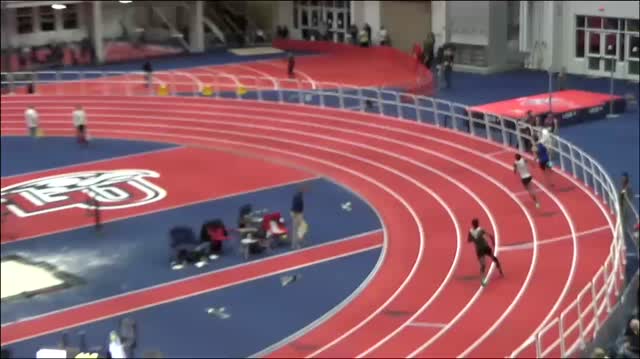
Jacob Jones is trading in the bright lights of Friday night football for a pair of track spikes and the chance at a collegiate future in running.
His decision is a somewhat rare one, at least when compared to the traditional blueprint of most high school athletes in his position.
Last fall, the soon-to-be high school junior was the starting varsity quarterback of his Virginia High School League football team at Fort Defiance High, a school of just over 800 students.
But after a winless football campaign -- which included a concussion late in his season -- and a promising sophomore track season, Jones, who stands about 5-foot-11 and 155 pounds, decided to step away from America's most popular sport in favor of running.
"That was definitely like a hard idea I had to pass through my mind," Jones said. "With my friends, I was the QB. But I had to realize that I had to think of the bigger picture. I wasn't really liking football as much anymore. It wasn't my sport. I really realized that I wanted a future in running."
Jones' hometown newspaper, The News Leader, first reported the news.
"It's a conversation Jacob and I have been mulling over for quite a while," said Stephen Metcalfe, who coaches Fort Defiance's cross country team and its distance runners in track. "I knew back in middle school that he could be a really good runner. He was really talented, but I knew that he loved football."
Jones, who started playing football at the age of 9, certainly isn't the first to make a big career switch, but it does certainly present an interesting case study.
How many starting high school quarterbacks would give up the QB1 moniker and the glory of Friday nights for fartleks, intervals, long runs, and weekends spent at meets and invitationals? How many would buck popular culture for subculture?
Jones doesn't care.
"I don't really see it like that. I just see it as I'm playing sports," he said. "I don't see it like that."
This season, Jones had to accept a tougher reality. His football coach wouldn't let him double in both football and cross country -- even though he accomplished that feat as an eighth- and ninth-grader. Some of that was fear that it would fatigue Jones and put him at more risk for injury. As a result, Jones didn't run in the fall. On most levels, it was understandable.
"We knew he was going to have a much more prominent role on the football team and he would be in a situation where he was going to miss quite a few meets," Metcalfe said. "I wouldn't be able to count on him in some of those big Saturday meets. So we let it be. We let him focus on football."

But Jones didn't want to give up cross country -- as a freshman, he ran in three meets and had a best of 18:49.80. "I just want to become a better runner," he said.
And maybe that work in the fall on area cross country courses could have made a difference in the spring when he was gearing up for track in the 800m and 1600m.
Offseason base work and conditioning is of the utmost importance for spring track and field athletes. Those who don't take precaution with preseason work sometimes can't make up for it in time -- district, region, state awards, not to mention personal bests.
"That's the main thing," Jones said. "This is going to be the first year I will actually focus on running. I want to lower my times a lot more. I dropped a little more my freshman and sophomore year. But now, that's definitely a big goal for mine."
Jones' decision ultimately could change his future on the track.
From a state perspective, he's a promising talent who could blossom with enough dedication and the right coaching. He ranked No. 35 in the state for sophomores in the 800m with a season best of 2:03.02 and was No. 45 in the 1600m with a time of 4:38.38.
Consider the example of Everett Smulders, an Atlanta Lovett (GA) High graduate who signed with the University of Mississippi in October.
A mid-distance talent, Smulders ran a freshman best of 2:21.09 in 2014. He cut 24 seconds as a sophomore, hitting 1:57.77 on the clock, and then did it again as a junior before he broke through as a senior, winning a state title in 1:54.9.2 He wasn't finished. He later recorded a U.S. No. 14 time of 1:50.70 at the Georgia Meet of Champions.
It presented a 31-second improvement from his freshman to senior seasons.
Smulders was invited to Brooks PR, a national meet featuring some of the best runners in the country, and finished ninth in the 800m in 1:54.06.
Which is to say, with enough focus, talent and strategy, anything can happen.
"The next two years is really going to tell the story with that," Metcalfe said. "With how much he rose as a runner this spring, I mean it will be very interesting. I don't like to say the word potential, because everybody has the potential for great things.
"But he has the drive and the passion where he could be really good."
This spring, Jones was the anchor on his team's state-qualifying 4x800m relay and ran a 2:01 split at regions to help the team net a state bid, Metcalfe said.
And for what it's worth, Jones' football coach is an assistant coach on the track and field team. He's supported the runner in his aspirations.
"He said he would always be there for me," Jones said of his discussion with his football coach. "He was totally fine with it."
As much as football is America's favorite pastime, running is what hooked this former quarterback.
___
Contact National Content Producer Cory Mull at cory.mull@flosports.tv or on Twitter @bycorymull





